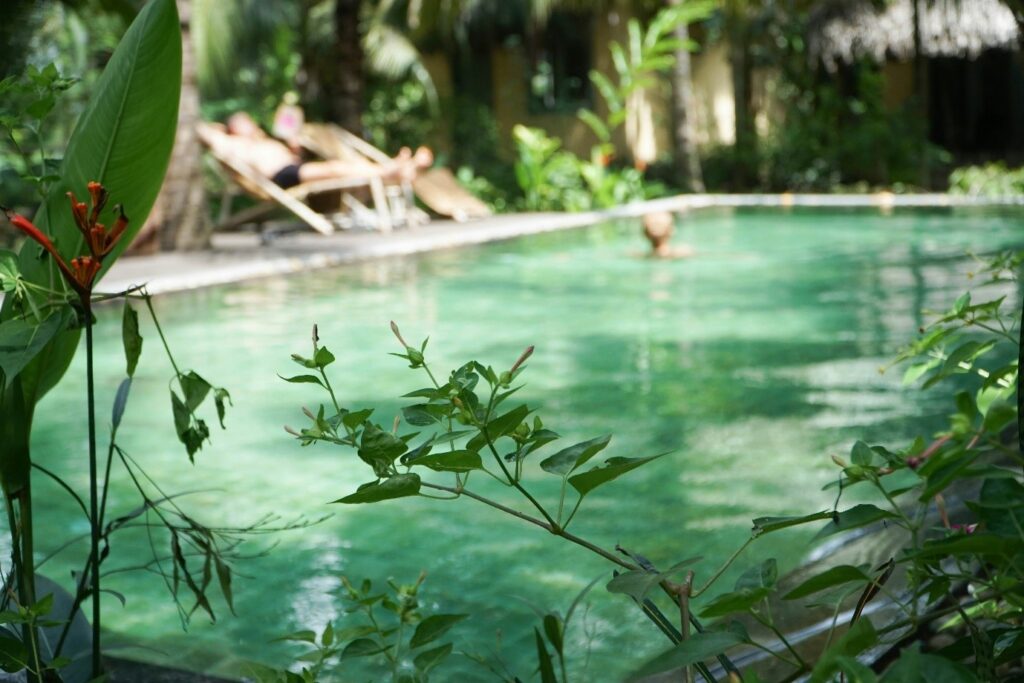
Backyard Pools and Sustainable Living
Backyard pools are part of the growing trend toward sustainable living as homeowners become more conscious of their environmental impact. Although pools are frequently thought of as luxury amenities, they may be both decadent and environmentally responsible with the correct design. Using eco-friendly pools sustainable tips for modern owners can help you save energy, cut down on waste, and match your lifestyle with more environmentally responsible ideals, whether you’re building a new pool or renovating an old one.
Why Sustainable Pools Matter
Conventional pools use high quantities of chemicals, water, and power. Over time, the accumulation of these resources leads to increased utility costs and environmental damage. Chlorinated water needs to be handled and disposed of carefully, and pool heaters, pumps, and lighting can put a strain on your home’s energy consumption.
Modern pool owners can drastically lessen their ecological effect by switching to eco-friendly pools sustainable tips for modern owners. Reduced operating expenses, enhanced health and safety, and the fulfillment of supporting environmental stewardship are among the advantages. Green pool systems are the new norm for conscientious homeownership; they are no longer a specialty.
Energy-Efficient Pool Equipment
One of the biggest improvements you can make is switching to energy-efficient pool pumps. Unlike conventional single-speed pumps that run at full throttle all the time, variable-speed pumps modify their power according to demand.
Solar-powered pool heating is another wise purchase. During the warmer months, these systems use solar energy instead of gas or electricity for heating. Long-term savings make up for the greater initial setup costs, particularly in sunny states like Florida and Texas.
Remember the lights. Using LED pool lighting instead of halogen lights reduces energy consumption significantly and provides a multi-color, customizable atmosphere that is ideal for entertaining guests or swimming in the evening.
Eco-Friendly Pool Water Treatment
The storage of chemicals, the possibility of skin irritation, and environmental runoff are the disadvantages of traditional chlorine pools, notwithstanding their effectiveness. Thankfully, there are now more eco-friendly and clean choices for pool water treatment.
Softer water and less chemical additions are produced via saltwater chlorination systems, which employ salt to naturally produce chlorine. They need less constant care and are kinder to the skin.
By disinfecting water without the use of harsh chemicals, UV and ozone systems go one step further. This lessens your reliance on chlorine and gives you healthier water.
Think about natural pool alternatives for the most organic approach. These systems don’t utilize chemicals to keep the water clean; instead, they use biological filters and aquatic plants.
Sustainable Pool Construction Materials
Making ethical material selections is the first step in creating a sustainable pool. The environmental impact of your pool can be considerably decreased by using recycled or repurposed materials, such as low-carbon concrete, recovered wood, or recycled glass tiles.
Consider low-impact decking materials like permeable pavers, bamboo, or composite wood. These options allow rainwater to seep into the ground, reducing stormwater runoff and heat absorption.
Smart Pool Technology for Efficiency
Automation from smart pool systems makes it easier to control lighting, filtration, and pumps. You can monitor energy usage in real time and operate your pool during off-peak hours using smartphone apps and home integration.
Better decisions about when and how your equipment operates are made possible by energy monitoring technologies, which can result in observable cost savings and increased operational efficiency.
Water Conservation Techniques
Traditional pools can waste a lot of water, which is a vital resource. Pool covers preserve water temperature, keep debris out, and minimize evaporation.
Rainfall harvesting systems lessen reliance on municipal water by collecting rainfall to top off the pool. Recycling backwash water is another wise decision that lets you clean and reuse water that is often lost while cleaning filters.
One of the best ecological enhancements is a solar heating system. They drastically reduce heating expenses by harnessing solar energy and transferring it to your pool’s water.
Both evacuated tube systems and flat-plate collectors are effective, though the latter is more efficient.
Natural Swimming Pools
Beautiful and environmentally sustainable, natural pools filter water using biological processes rather than chemicals. A swimming area and a regeneration zone with water-purifying pebbles and aquatic plants make up these two areas.
In addition to promoting biodiversity, its design makes swimming more peaceful and natural. They pay off with minimal upkeep and no chemical use, but setup necessitates preparation and room.
Eco-Conscious Pool Landscaping
You may save water and improve the aesthetics of your pool by using shade trees, native plants, and xeriscaping techniques. Shade trees help to lower evaporation, and native plants require less watering.
Rainwater may seep into the ground thanks to permeable pavers, which also enhance the aesthetics of your pool area and aid in sustainable water management.
Maintenance Practices for Sustainable Pools
Green maintenance entails selecting non-toxic cleaning supplies and routinely inspecting machinery to ensure peak performance. Water is kept clear without endangering the environment thanks to environmentally friendly enzymes and cleansers.
Frequent maintenance keeps water quality constant, lowers energy consumption, and prolongs the life of pool systems.
Costs vs. Long-Term Savings
Although eco-friendly improvements may cost more up front, there is no denying their long-term advantages. Sustainable elements, such as solar heaters and energy-efficient pumps, lower monthly costs and lessen the need for frequent maintenance or replacements.
In addition to saving money, eco-friendly pools raise the value of homes and draw in eco-aware purchasers.
Conclusion
Homeowners have the chance to set an example as climate awareness rises, beginning in their own backyards. Adopting eco-friendly pools sustainable tips for modern owners improves your property’s efficiency, beauty, and value while also lessening your influence on the environment. Sustainable pool ownership only requires little, gradual adjustments rather than a total makeover. For years to come, take pleasure in a cleaner, greener pool experience by starting small and making prudent investments.
Connect with us on Facebook for the latest updates and news.
Join our Instagram community for visual inspiration and behind-the-scenes moments.
For any queries, Contact us!












